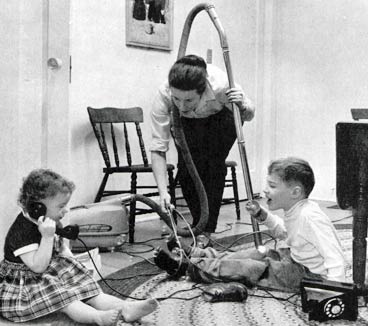If there was pressure to conform — as Fromm, Gropius, and Rickover claimed— where did it come from? What did it sound like? Who was responsible?
It’s difficult to point out how society shapes people and their beliefs. The pressure to conform is subtle and, often, unintentional —for men, at least. Women, on the other hand, have a great deal of social instruction thrown at them. Moreover, they are usually handed a large pile of expectations in their teen years. The expectations are often reinforced by the media who were heavy users of clichés and stereotype.
Today, the pressure is less obvious, but in the 1950s, the traditional image of women as nurturers and little else was endlessly repeated in new stories, advertising, and popular entertainment. Here, for example, is Peg Bracken in 1958 telling readers “My Husband Ought To Fire Me!” for not being a cost-effective source of domestic help.
If you are at all attuned to the times, you know that a housewife isn’t a housewife any more. She is a versatile expert, a skilled professional business manager, practical nurse, house cleaner, child psychologist, home decorator, chauffeur, laundress, cook, hostess — all this, besides being a gay, well-groomed companion. And she is therefore worth, at prevailing wage rates, about $20,000 a year — or, anyway, a lot more than her husband.
A lot of recent literature has tried to establish this point. Some of it is written by men, and I can’t decide whether they are chivalrous or just cowed. But that quiet tittering you hear in the back row comes from the women, who know different. Housewife, homemaker, it’s still spinach. Women are honest about the important things. This is one of their many lovable qualities.
Well, it is fun to be chucked under the chin, but reaction sets in the minute we housewives — and I think I’ll just continue to use that dirty old world — the minute we housewives really look ourselves in the eye. Practically any housewife who tots up — as I have just totted up — what she’d be worth in today’s labor market is apt to find herself in a nervous condition bordering on the shakes. From my own computations one salient fact emerges loud and clear; all my household skills together wouldn’t earn enough to maintain one small-sized guppy.
In a word, nobody would have me except a husband. What is more, I’d call this a fairly general state of affairs.
Yes, she is being humorous. But humor sits atop reality, and the reality of this article is that the American woman of the 1950s lived with assumptions about her self worth, much of it concerning her ability to cook, clean, raise children, and be pretty happy about the whole deal.
The blunt fact is most housewives are pretty good at a couple of things, fair to middling at a couple of others, and as for the rest, they do them when and if they have to, and lousily. A man never knows which one or two housewifely talents he’s getting when he marries either. No matter what good fudge she made in her bachelor-girl apartment, he can’t be sure! That is one of the things that makes marriage so exciting.
Let’s face it; we housewives are jugglers who, trying to keep a dozen nice big fresh eggs in the air, spend most of our time skidding in the shells. Once in a blue moon, for the fast wink of an eye, all the eggs stay up.
There’s an important item Peg Bracken left out of this article. One of the eggs she juggled was her career as advertising copywriter and free-lance humorist for The Saturday Evening Post. Her article doesn’t mention the pressurs of rewriting, editing, billing, or selling her work. Of the fact that she quietly supported her role as a traditional American woman with a non-traditional job.
There were millions of women like her who tried living within an old-fashioned model of womanhood while taking on un-ladylike work and “mannish” responsibilities. In time, the charade grew tiresome for many women, and they gave up supporting a social role that didn’t support them.
A “women’s liberation movement” arose in the 1960s, offering ideas and demands, some radical and some unarguably sensible. There was resistance, of course, but there were fierce defenders of women’s rights, such as Brigid Brophy who argued “Women Are Prisoners Of Their Sex” in 1963.
So brilliantly has society contrived to terrorize women with [the] threat that certain behavior is unnatural and unwomanly, that it has left them no time to consider – or even sheerly observe — what womenly nature really is. For centuries arrant superstitions were accepted as natural law. The physiological fact that only women can secrete milk for feeding babies was extended to the pure myth that it was women’s business to cook for and wait on the entire family. The kitchen became woman’s “natural” place because, for the first few months of her baby’s life, the nursery really was. To this day a woman may fear she is unfeminine if she can discover in herself no aptitude or liking for cooking.
If a woman who is irked by confinement to the kitchen merely looks around to see what other women are doing and finds they are accepting their kitchens, she may well conclude that she is abnormal and had better enlist her psychoanalyst’s help toward “living with” her kitchen. What she ought to ask is whether it is rational for women to be kept to the kitchen.
I must add a final note about Peg Bracken, who had never believed that women should like the status quo. In 1960, she published “The I Hate To Cook Book,” a humorous guide to preparing fast, easy meals and saving time for something more rewarding. Her preface announced, “Some women, it is said, like to cook. This book is not for them.” This exclusion still left a sizeable number of women: three million readers, in fact.
The book changed her life by making her a celebrity. It produced another, unexpected change when she showed the manuscript to her husband for his opinion. “It stinks,” he said. She decided then that she ought to fire her husband. They were soon divorced.
![]() Read “My Husband Ought to Fire Me!” by Peg Bracken.
Read “My Husband Ought to Fire Me!” by Peg Bracken.
Become a Saturday Evening Post member and enjoy unlimited access. Subscribe now




Comments
Thank God for women like Kate Hepburn and Peg Bracken, but I must confess that I always wanted to put a dress on from the 50’s and heels too; and serve my children their breakfast before they took off from school in the early 80’s. I would have loved to hear and see their reactions.
Sorry about that, Susan. The link is now fixed.
Anyone know where I can access Bracken’s article? The PDF link seems to be broken.
At least Peg Bracken handed the female expectations with humor – which is the only way she would have gotten by with her views. The author is right in that conformity was highly structured for women! One wonders how a Kate Hepburn (who wore – gasp – pants and eschewed marriage) or a Peg Bracken ever came about. Not being a June Cleaver – or June-Cleaver-wannabe took guts!
T.V. Moms – June and Harriet,
Laura and Alice and Lucy,
And Samantha and Margaret –
Icons of domesticity.
Some wore pearls and heels to serve lunch.
Blue jeans – none of them ever chose.
Mild mannered and they smiled a bunch,
With perhaps a twitch of her nose.
For the children, ever the touch
Of perfection in matters all.
With Hubby, no sex stuff or such,
Censors ever on beck and call.
T.V. Moms went a bit too far
When Mom was “My Mother the Car.”